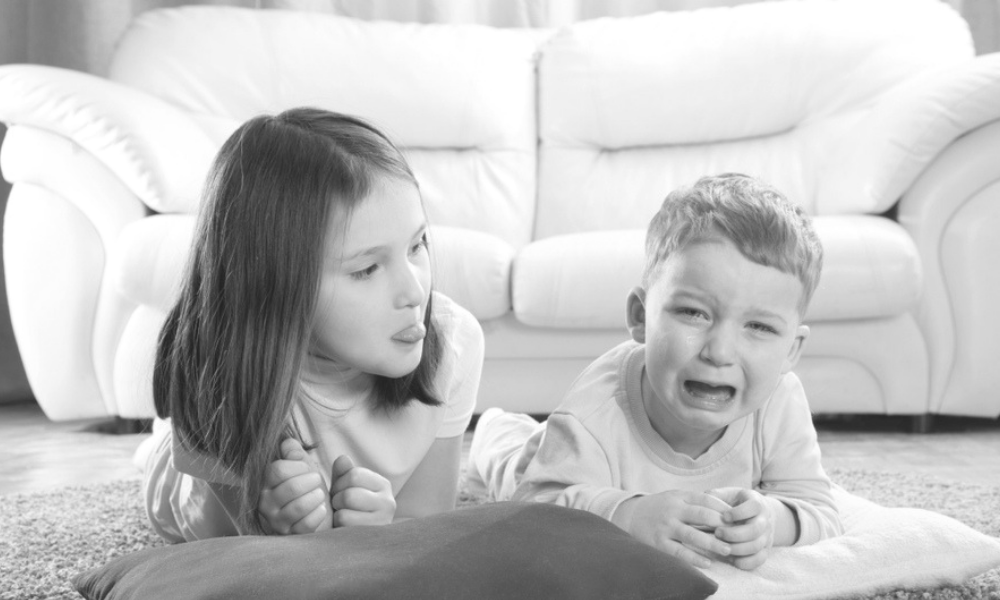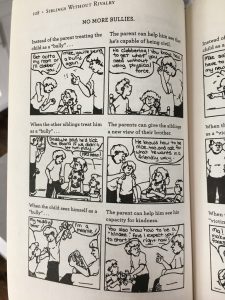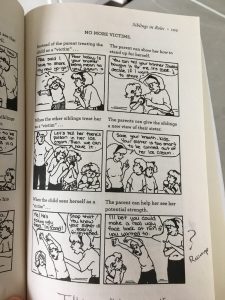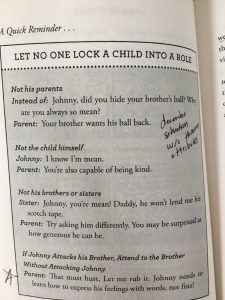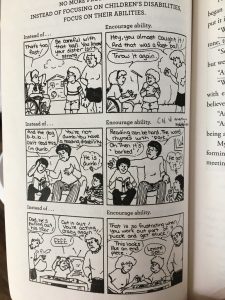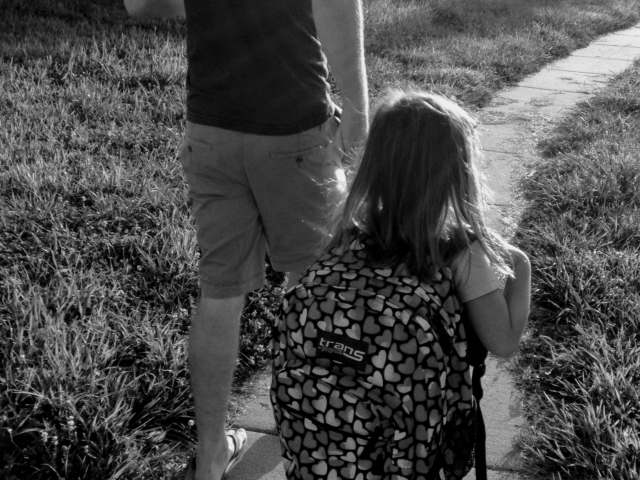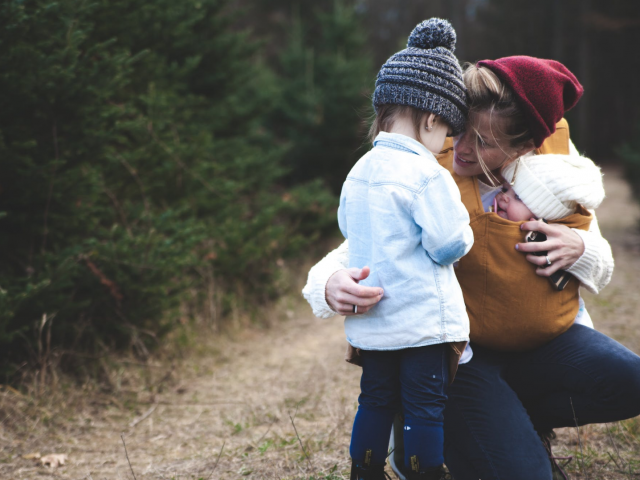I do it.
You probably do it, too.
When our children have a certain set of behaviors and tendencies, then we create a label specifically for them. Maybe they’re the athletic child, assertive child, introverted child, etc. It’s our way of assigning them their role in the household while patting ourselves on the back because we’ve got them all figured out.
But what if instead of having them “figured out”, we have limited and sold them short?
Reasons Why We Assign Roles to Our Kids
- Misguided Need to Bolster a Child’s Ego (at their siblings expense)- For instance, we might convince one of our kids that they’re the “responsible one” as a way of helping them cope with a stressful situation.
- Misguided Need to Bolster Our Own Ego- If you were timid or shy, you may brag about having a “daring” or “gutsy” kid.
- Project Our Weaknesses Onto Our Children- Sometimes the very traits that we dog on our kids for, we exhibit ourselves.
- We Have Our Kids “Figured Out”- There is some satisfaction in feeling that we have our kids pegged.
- A Way For Each Kids to Feel Special- When we assign each kid a role, it’s like we’re giving them their own separate identity and domain.
And on top of parents assigning roles to our kids, the kids do it to themselves. There are benefits that come with being the “helpless” kid or the “family clown’ so kids stick with those roles for the payoff. If that wasn’t bad enough the siblings put each other in roles, too.
But Couldn’t It Be Beneficial To Be In a Role?
So let’s say that you do have a child that is more academically inclined, wouldn’t it motivate them to be doted on as the “brains in the family”?
Sure, they have advantages, but where does that leave the other siblings? Are they suddenly second rate? Clearly, you can see where this might create some hostility in the sibling relationship.
Even in a favored role, however, it’s not a walk in the park for the privileged child. One story recounted by a woman said she was praised for being “the responsible one” in her family. As such, she had lots of pressure and expectations to meet. And even to this day, her siblings play the role of “helpless” so she’s stuck to manage all the family problems.
Once the drama was cast, the characters seemed to play out their part compulsively.
It seemed that often there were often counterpart roles. A clean child, a slob child. A responsible child, a wild child. A bully, a victim. A punctual child, a late child. Children were picking diametrically opposite roles simply so they would have no overlapping association with their siblings.
Wouldn’t it be great, though, if a family with different roles meshed harmoniously together?
As the author states, “I suppose so, but we also need to prepare our children for life outside the family. And life demands that we assume many roles. We need to know how to care for and be cared for; how to be leaders and followers; how to be serious and a little “wild”; how to live with disorder and how to create order. Why limit any of our children? Why not encourage all of them to take chances, explore their potential, discover strengths they never dreamed lay within them.”
A Story Too Important NOT to Share
People have natural abilities and natural limitations. No one would argue against that. So what if we, as parents, simply steered our children towards the areas they would excel in (and discourage the things they would “fail” at)?
This example from the book needs to be told.
“My parents gave me piano lessons when I was eight. My little sister used to watch me practice, and when I finished she would sit down at the piano and try to copy me. Then one day she went to the piano and, without a single lesson, played the piece I had been struggling to learn for over a month. After that, I stopped practicing. I told my mother I didn’t want lessons anymore.”
“And your mother let you stop?”
She nodded.
“I wonder, how would it have been, if instead of accepting your decision, your mother had said, “I see no reason to quit. You seem to be enjoying the piano and you’re making progress.”
“But you’re wasting your money. Ruth plays better. She knows my whole piece already.”
The author continued speaking as her mother: “I can see how that could be discouraging, but Ruth’s playing has nothing to do with you. Whether someone learns a piece quickly or slowly isn’t important. What’s important is the meaning you bring to the music that no one else will. What’s important is the enjoyment you get from playing. I wouldn’t ever want you to deprive yourself of that.”
The woman replied, “That would have meant everything to me.”
Conclusion of this story: There are a lot of little boys and girls out there who are being cheated out of their rightful opportunities because of a sibling’s special prowess.
How Do We Free Our Children From Roles?
At this point we know we, as parents, assign roles, kids assign themselves roles, siblings assign roles, and likely, the outside world assigns roles? Some key takeaways we need to acknowledge before we can free our children from roles:
- No child should be allowed to monopolize one area of human endeavor.
- Just because a child does well academically, doesn’t mean that they’re “The Scholar” in the family. In fact, labeling a child with “The _____” probably isn’t a good idea.
- Kids have natural abilities that should be encouraged. Just not at the expense of their sibling. (ie “Wow, you got that basket in one hoop and it took your brother 5 tries”)
- Children are born with different personality traits. But as parents, we have the power to influence those traits, to give nature a helping hand. Let’s not place our children in roles that will defeat them or aggravate their sibling dynamic.
In order for us to view our kids beyond a certain label, we must first treat them not as they are, but as the potential we see for them. Just because one kid is extremely shy, does not mean we continue to feed into that thinking. We had to start thinking them as a child who was capable of being assertive.
We needed to find the qualities we desired for our kids and affirm those. For instance, a child who is often mean needs to hear “I know you’re capable of being nice, I’ve seen you do it and that’s how I expect you to treat your siblings.”
Even more so, we had to help paint our kids in a different light and encourage them to see themselves in a new way. Again, instead of trying to describe, here are screenshots from the book:
Children Who Need More Attention
As if this chapter isn’t already a beast to try to summarize and blog about, there’s really one more section that’s too important to miss. (But Cam, you say that about every section! It’s true, you’re right.)
What if there was a child who naturally needed more attention either because they were handicapped, sick, or had some other special need? This is a role they can’t be “freed” from because it’s tied with their identity- by no fault of anyone.
From some examples of the book for people who grew up with these siblings, here’s what was concluded from the book:
- The problem child becomes more of a problem
- The burdened parent begins to make demands upon the ‘normal’ children to compensate for the problem child.
- The needs of the normal siblings are brushed aside.
- The normal siblings begin to resent the problem child.
Again, here are illustrations from the book to help explain:
Conclusion for this section is that it’s up to the parents to set the tone. To make it clear that no one in the family is “the problem” and to emphasize less on their inability, instead on their ability. Some of us might have greater needs, but we all need to be accepted as we are. And each of us is capable of growth and change.
For more info on children in roles, check out this summary I wrote called “We Need to Quit Putting Our Kids in Boxes“. Important Note: This chapter is especially useful for parents of twins. It’s easy to see them as “one being” instead of two individuals. Careful not to box them in or create any opposite dynamic. (ie Good/Evil Twin, Shy/Outgoing Twin, etc.)


